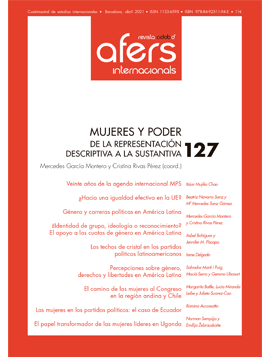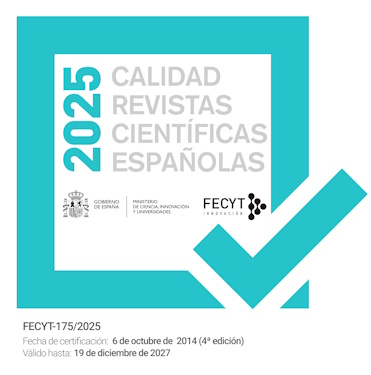El papel transformador de las mujeres líderes en la lucha contra la corrupción en Uganda
Paraules clau:
mujeres y poder, corrupción, Uganda, agencia, motores para el cambioResum
Revista CIDOB d’Afers Internacionals, n.º 127
Cuatrimestral (enero-abril)
ISSN:1133-6595
E-ISSN:2013-035X
DOI: doi.org/10.24241/rcai.2021.127.1.229
Las mujeres ugandesas han conseguido emanciparse y alcanzar puestos clave de poder en el sector público. Sin embargo, aún pugnan por ejercer una influencia decisiva en la lucha contra la corrupción. La presente investigación, de metodología mixta, analiza las causas principales de la corrupción y el efecto que esta tiene sobre el papel de las mujeres en su lucha contra dicha lacra. Se concluye que las mujeres que están en el poder en Uganda, aunque consiguen mayor transparencia, se han visto sobrepasadas por la percepción colectiva de que quienes ostentan el poder se ven involucrados en prácticas de corrupción y por la necesidad de supervivencia política en un sistema político patrimonial. No obstante, cuando se les ha otorgado espacio y agencia, han sido transformadoras, como fue el caso de la lucha contra el VIH y los cambios que inspiró Allen Kagina desde la Autoridad Fiscal y la Autoridad Nacional de Carreteras de Uganda.
Referències
Ahikire, Josephine. «Towards women’s effective participation in electoral processes: a review of the Ugandan experience». Feminist Africa, n.° 3 (2004), p. 8-26.
Amundsen, Inge. Political corruption and the role of donors (in Uganda) [Commissioned Report]. Bergen: Chr. Michelsen Institute, 2006.
Asiimwe, Godfrey B. «Of Extensive and Elusive corruption in Uganda: neo-patronage, power, and narrow interests». African Studies Review, vol. 56, n.° 2 (2013), p. 129-144.
Afrobarometer. «Round 7 corruption perception in Uganda». Afro barometer, Análisis de datos en línea, (2020) (en línea) [Fecha de consulta: 03.06.2020] https://afrobarometer.org/online-data-analysis/analyse-online
Bakuluki, Paul. «When I steal, it is for the benefit of me and you: Is collectivism engendering corruption in Uganda?». International Letters of Social and Humanistic Sciences, vol. 5, (2013), p. 27-44.
Banco Mundial. «World bank governance». World Bank, (2019) (en línea) [Fecha de consulta: 04.06.2020] https://databank.worldbank.org/source/worldwide-governance-indicators
Banco Mundial. «Control of corruption and government effectiveness». World Bank, (2020) (en línea) [Fecha de consulta: 04.06.2020] https://databank.worldbank.org/source/worldwide-governance-indicators/preview/on#
Barigaba, Julius. «Uganda Executive, MPs in tussle overuse of Covid-19 funds». The East African, (16 de mayo de 2020) (en línea) [Fecha de consulta: 06.06.2020] https://www.theeastafrican.co.ke/news/ea/Uganda-executive-MPs-in-tussle-over-use-of-Covid19-funds/4552908-5554338-m963anz/index.html
Boehm, Frédéric. «Are men and women equally corrupt?». U4 Brief, n.° 6, (mayo de 2015) (en línea) [Fecha de consulta: 04.06.2020] https://www.u4.no/publications/are-men-and-women-equally-corrupt.pdf
Bush Institute. «Her Excellency Mrs. Janet Museveni and Building an Agriculture Program: A case study of the George W Bush institute’s First Ladies Initiative». Bush Institute, (febrero de 2015) (en línea) [Fecha de consulta: 04.12.2020] https://gwbcenter.imgix.net/Resources/flicasestudy-museveni.pdf
Carney, James J. «The politics of ecumenism in Uganda, 1962-1986». Church History, vol. 86, n.° 3 (2017), p. 765-795.
Daily Monitor. «UNRA board endorses Kagina’s second term». Daily Monitor, (12 de febrero de 2020) (en línea) [Fecha de consulta: 08.122020] https://www.monitor.co.ug/uganda/news/national/unra-board-endorses-kagina-s-second-term--1874812
Desmidt, Sophie; Apiko, Philomena y Sævarsson, Karl. «Women and mediation in Africa under the APSA and the AGA». ECDPM, Discussion Paper n.° 217, (diciembre de 2017) (en línea) [Fecha de consulta: 03.06.2020] https://ecdpm.org/wp-content/uploads/DP217-Women-Mediation-Africa-APSA-AGA-ECDPM.pdf
Dollar, David; Fisman, Raymond y Gatti, Roberta. «Are women really the “fairer” sex? Corruption and women in government». Journal of Economic Behavior & Organization, vol. 46, n.° 4 (2001), p. 423-429.
Edroma, Evelyn. «Promoting gender equality in the judiciary». United Nations Development Programme, blog, (5 de julio de 2019) (en línea) [Fecha de consulta: 09.06.2020] https://www.undp.org/content/undp/en/home/blog/2019/promoting-gender-equality-in-the-judiciary.html
Equality Uganda. «Women representation in Uganda’s cabinet decline by 7% signifies need to accelerate a 50/50 male/women representation campaign». Equality Uganda, (7 de enero de 2020) (en línea) [Fecha de consulta: 09.06.2020] http://equalityuganda.org/wp-content/uploads/2020/03/STATEMENT.pdf
Goetz, Anne Marie. «No shortcuts to power: constraints on women's political effectiveness in Uganda». The Journal of Modern African Studies, vol. 40, n.° 4 (2002), p. 549-575.
Goetz, Anne Marie. «Political cleansers: women as the new anti-corruption force?». Development and Change, vol. 38, n.° 1 (2007), p. 87-105.
Green, Edward; Halperin, Daniel; Nantulya, Vinand y Hogle, Janice. «Uganda's HIV prevention success: the role of sexual behavior change and the national response». AIDS and Behavior, vol. 10, n.° 4 (2006), p. 335-346.
Horn, Patricia. «Post-apartheid South Africa: What about women's emancipation?». Transformation: Critical Perspectives on Southern Africa, n.° 15 (1991), p. 25-39.
Human Rights Watch. «Letting the Big Fish Swim. Failure to Prosecute High-Level Corruption in Uganda». Human Rights Watch, Report, (21 de octubre de 2013) (en línea) [Fecha de consulta: 20.06.2020] https://www.hrw.org/report/2013/10/21/letting-big-fish-swim/failures-prosecute-high-level-corruption-uganda
Human Rights Watch. «Uganda: Government gunmen storm high court again». 2007 (Fecha de consulta 09/08/2020) https://www.hrw.org/news/2007/03/05/uganda-government-gunmen-storm-high-court-again
Inspectorate of Government. The 3rd National Integrity Survey (NIS III). Inspectorate of Government, The Republic of Uganda, (octubre de 2008) (en línea) [Fecha de consulta: 01.06.2020] https://www.igg.go.ug/static/files/publications/third-national-integrity-survey-report.pdf
Inter-Parliamentary Union. «Historical archives of parliamentary elections results». Inter-Parliamentary Union, Uganda Parliament, (2020) (en línea) [Fecha de consulta: 07.06.2020] http://archive.ipu.org/parline-e/reports/2329_arc.htm
Johnson, Deb; Kabuchu, Hope y Kayonga,Vusiya. «Women in Ugandan local government: the impact of affirmative action». Gender & Development, vol. 11, n.° 3 (2003), p. 8-18.
Kaaya, Sadab K. «NRM MPs get age limit cash». The Observer, (16 de enero de 2019) (en línea) [Fecha de consulta: 04.062020] https://observer.ug/news/headlines/59668-nrm-mps-get-age-limit-cash
Kadaga, Rebeca. «Women's political leadership in East Africa with specific reference to Uganda». Commonwealth Governance Handbook, (2013), p. 32-36.
Kasfir, Nelson y Twebaze, Stephen H. «In name only: Uganda’s Constituency Development Fund», en: Baskin, Mark y Mezey, Michael (eds.). Distributive Politics in Developing Countries: Almost Pork. Lanham, MD: Lexington Books, 2014, p. 83-106.
Krasnopolska, Tetyana. «Gender-balanced participation in public administration as a factor for overcoming of corruption». European Political and Law Discourse, vol. 2, n.° 3 (2015), p. 197-202.
Limo, Irene. «What do networks of women mediators mean for mediation support in Africa?». Accord, Conflict Trends 2018/1 (en línea) [Fecha de consulta: 03.062020] https://www.accord.org.za/conflict-trends/what-do-networks-of-women-mediators-mean-for-mediation-support-in-africa/
Lumu, David. «Kagina is new executive director of UNRA». New Vision, (2015) (en línea) [Fecha de consulta: 07.12.2020] https://www.newvision.co.ug/news/1324788/kagina-executive-director-unra
Marquette, Heather y Peiffer, Caryn. Corruption and collective action. DLP, Research Paper, (enero de 2015) (en línea) https://www.dlprog.org/publications/research-papers/corruption-and-collective-action
Mason, Andrew y King, Elizabeth. Engendering development through gender equality in rights, resources, and voice [policy research report]. Washington, DC: WorldBank, 2001 (en línea) [Fecha de consulta: 06.06.2020] http://documents.worldbank.org/curated/en/512911468327401785/Engendering-development-through-gender-equality-in-rights-resources-and-voice
Mo Ibrahim Foundation. Index of governance in Africa (IIAG Anti-corruption score for Uganda) 2019 (en linea)[Fecha de consulta 08.09.2020] https://iiag.online/data.html?meas=SROL|PRI|FEO|HD&loc=UG&view=table
Moghadam, Valentine M. y Senftova, Lucie. «Measuring women's empowerment: participation and rights in civil, political, social, economic, and cultural domains». International Social Science Journal, vol. 57, n.° 184 (2005), p. 389-412.
Mugyenji, Joachim. «Uganda’s anti-corruption policies merely institutionalizing corruption». The Observer, (8 de enero de 2020) (en línea) [Fecha de consulta: 14.06.2020] https://observer.ug/viewpoint/63130-uganda-s-anti-corruption-policies-merely-institutionalizing-corruption
Mutibwa, Phares M. Uganda since independence: a story of unfulfilled hopes. Trenton, NJ: Africa World Press, 1992.
Mwesigwa, Alon. «Activist who branded Uganda president “a dirty, delinquent dictator” is jailed». The Guardian, (2 de agosto de 2019) (en línea) [Fecha de consulta: 12.06.2020] https://www.theguardian.com/global-development/2019/aug/02/activist-who-branded-uganda-president-a-dirty-delinquent-dictator-faces-jail-yoweri-museveni-cyber-harassment
Namakula, Valentine. «Uganda’s war on corruption». The independent, (2019) (en línea) [Fecha de consulta: 07.12.2020] https://www.independent.co.ug/ugandas-war-against-corruption/
Nye, Joseph S. «Corruption and political development: A cost-benefit analysis». American political science review, vol. 61, n.° 2 (1967), p. 417-427.
Obbo, Christine. «What women Can do: AIDS crisis management in Uganda», en: Bryceson, Dedorah (ed.). Women wielding the hoe: Lessons from rural Africa for feminist theory and development practice. Washington: Berg, 1995, p. 165-178.
Olaki, Emmy. «Kagina gets leadership award». The New Vision, (2006) (en línea) [Fecha de consulta: 07.12.2020] https://www.newvision.co.ug/news/1154865/kagina-leadership-award
ONU-Organización de las Naciones Unidas. «Beijing declaration and platform for action». The fourth World Conference on Women, (15 de septiembre de 1995) (en línea) [Fecha de consulta: 02.06.2020] https://www.un.org/en/events/pastevents/pdfs/Beijing_Declaration_and_Platform_for_Action.pdf
Ottemoeller, Dan. «The politics of gender in Uganda: symbolism in the service of pragmatism». African Studies Review, vol. 42, n.° 2 (1999), p. 87-104.
Pankhurst, Donna. «Women and politics in Africa: the case of Uganda». Parliamentary Affairs, vol. 55, (2003), p. 119-128.
The Tenth Parliament. (2018). «Composition of the 10th parliament». The Tenth Parliament, Uganda, (12 de abril de 2018) (en línea) [Fecha de consulta: 04.06.2020] https://www.parliament.go.ug/sites/default/files/COMPOSITION%20OF%20THE%2010TH%20PARLIAMENT%20AS%20AT%2012%20APRIL%202018.pdf
Persson, Anna; Rothstein, Bo y Teorell, Jan. «Why anticorruption reforms fail-systemic corruption as a collective action problem». Governance, vol. 26, n.° 3 (2013), p. 449-471.
PNUD-Programa de las Naciones Unidas para el Desarrollo. «Seeing beyond the state: Grassroots women’s perspectives on corruption and anti-corruption». UNDP, Huairou Commission: Women, Homes and Community, (2012) (en línea) https://www.undp.org/content/undp/en/home/librarypage/democratic-governance/anti-corruption/Seeing-Beyond-the-State-Grassroots-Womens-Perspectives-on-Corruption-and-Anti-Corruption.html
Rheinbay, Janna y Chêne, Marie. «Gender and corruption; topic guide. Transparency International anti-corruption help desk». Transparency International, (marzo de 2016) (en línea) [Fecha de consulta: 20.06.2020] https://www.transparency.org/files/content/corruptionqas/Topic_guide_gender_corruption_Final_2016.pdf
Rubongoya, Joshua. Regime Hegemony in Museveni’s Uganda: Pax Musevenica. Cham: Springer, 2007.
Sahay, Sushama. Women and empowerment: approaches and strategies. Nueva Delhi: Discovery Publishing, 1998.
Sardan, Jean-Pierre. « L’économique morale de la corruption en Afrique ». Politique Africaine, n.° 63 (1996), p. 97-116.
Sung, Hung-En. «From victims to saviors? Women, power, and corruption». Current History, vol. 105, n.° 689 (2006), p. 139-143.
Sutherland, Edwin. H. y Cressey, Donald. R. Criminology. Philadelphia: Lippincott, 1978.
Swamy, Anand; Knack, Stephen; Lee, Young y Azfar, Omar. «Gender and corruption». Journal of Development Economics, vol. 64, n.° 1 (2001), p. 25-55.
Taliercio, Robert J. «Designing performance: The semi-autonomous revenue authority model in Africa and Latin America». World Bank, Policy Research Working Paper n.° 3423, (octubre de 2004) (en línea) https://openknowledge.worldbank.org/handle/10986/14224?locale-attribute=es
Tamale, Sylvia. When hens begin to crow: Gender and parliamentary politics in Uganda. Londres: Routledge, 1999.
Tickner, J. Ann. «Gendering a discipline: Some feminist methodological contribution to international relations». Journal of Women in Culture and Society, vol. 30, n.° 4 (2005), p. 2.173-2.188.
Therkildsen, Ole. «Autonomous tax administration in sub-Saharan Africa: the case of the Uganda Revenue Authority». Forum for Development Studies, vol. 31, n.° 1 (2004), p. 59-88.
The Independent. (2016). «Ministers 28 out of 80». The Independent, (6 de junio de 2016) (en línea) [Fecha de consulta: 10.062020] https://www.independent.co.ug/ministers-more-women-than-men/
The Judiciary Uganda. «Página oficial The Judiciary». The Republic of Uganda, (2020) (en línea) [Fecha de consulta: 05.06.2020] http://judiciary.go.ug
The Observer. «Uganda-DRC roads: Red flags raised over project worthiness, Dott Services». The observer, (2020) (en línea) [Fecha de consulta: 08.12.2020] https://observer.ug/news/headlines/67357-uganda-drc-roads-red-flags-raised-over-project-worthiness-dott-services
Transparency International. «Corruption perception in Uganda». Transparency International, (2020) (en línea) [Fecha de consulta: 04.06.2020] https://www.transparency.org/en/cpi/2019/results/uga
Tumusiime, Ian. «Kagina builds new culture at UNRA». The independent, (14 de mayo de 2019) (en línea) [Fecha de consulta: 07.12.2020] https://www.independent.co.ug/kagina-builds-new-culture-at-unra/
United States Department of State. «Country report on human rights practices 2010». US Deparment of State, (2011) (en línea) https://2009-2017.state.gov/j/drl/rls/hrrpt/2010/index.htm













